江苏省泗洪中学高考英语一轮复习第三单元复习导学案牛津译林版选修6
高考英语一轮复习第三单元复习导学案牛津译林版选修6
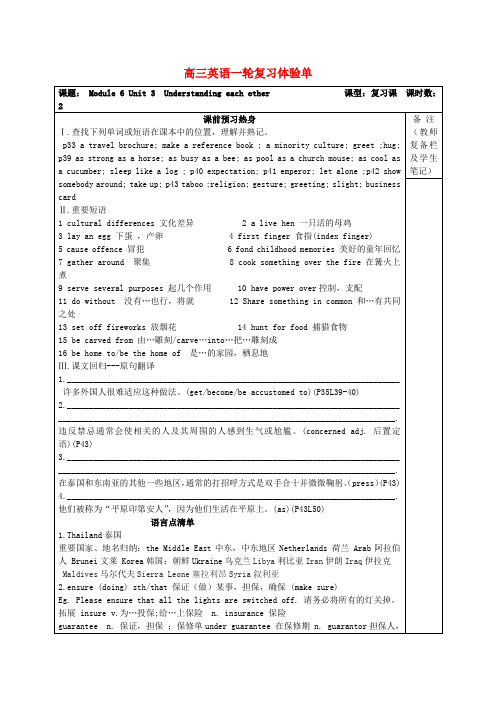
Eg. Please ensure that all the lights are switched off.请务必将所有的灯关掉。
拓展insure v.为…投保;给…上保险n. insurance保险
Eg. We guarantee to refund your money if you are not delighted with your purchase.
如果您对所购商品不满意,我们保证退款。
These days getting a degree doesn’t guarantee you a job.
高三英语一轮复习体验单
课题:Module 6 Unit 3 Understanding each other课型:复习课课时数:2
课前预习热身
Ⅰ.查找下列单词或短语在课本中的位置,理解并熟记。
p33 a travel brochure; make a reference book ; a minority culture; greet ;hug; p39 as strong as a horse; as busy as a bee; as pool as a church mouse; as cool as a cucumber; sleep like a log ; p40 expectation; p41 emperor; let alone ;p42 show somebody around; take up; p43 taboo ;religion; gesture; greeting; slight; business card
9 serve several purposes起几个作用10 have power over控制,支配
牛津译林版高中英语选修六Unit3《Understandingeachother》word导学案

tradition______________________________
routine ______________________________ 【选择】
(1) I’m trying to break the _________of getting up too late.(09 天津)
A. tradition B. convenience C. habit D. leisure
【短语】form / develop the habit of ______________
fall into / get into / slip into the habit of _______________
get out of / give up the habit of ______________________
10. excite (v.)--- n. _______________ 11.equally (adv.)--- n. _____________
12.brave (adj.)---n. _______________ 13.believe(v.) --- n. ________________
6. celebrate (v.)---n. _______________ 7. analyse (v.)--- n. ________________
8. ambition (n.)---adj.______________ 9. approval (n.)---v.______________
【翻译】13.参观者请源自触摸展品。The visitors ________________________ touch the exhibits.
高中英语 Unit 3 Understanding each other教案 牛津译林版选修6
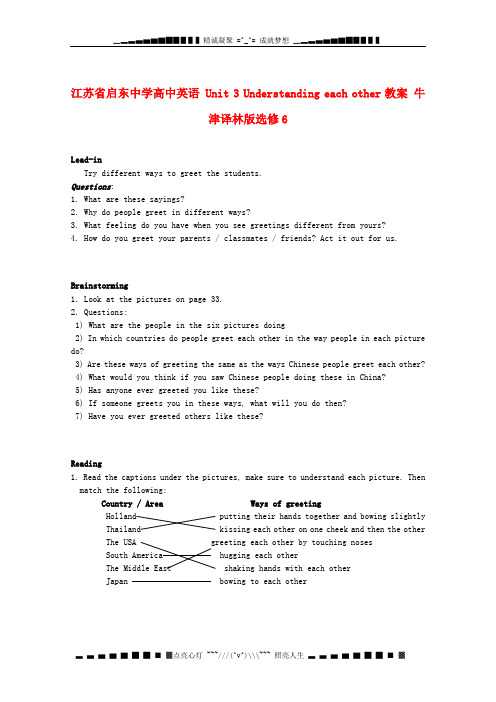
江苏省启东中学高中英语 Unit 3 Understanding each other教案牛津译林版选修6Lead-inTry different ways to greet the students.Questions:1. What are these sayings?2. Why do people greet in different ways?3. What feeling do you have when you see greetings different from yours?4. How do you greet your parents / classmates / friends? Act it out for us.Brainstorming1. Look at the pictures on page 33.2. Questions:1) What are the people in the six pictures doing2) In which countries do people greet each other in the way people in each picture do?3) Are these ways of greeting the same as the ways Chinese people greet each other?4) What would you think if you saw Chinese people doing these in China?5) Has anyone ever greeted you like these?6) If someone greets you in these ways, what will you do then?7) Have you ever greeted others like these?Reading1. Read the captions under the pictures, make sure to understand each picture. Thenmatch the following:Country / Area Ways of greetingHolland putting their hands together and bowing slightly Thailand kissing each other on one cheek and then the other The USA greeting each other by touching nosesSouth America hugging each otherThe Middle East shaking hands with each otherJapan bowing to each otherPractice1. Ask the students to talk about different greeting habits. For example:People around the world have their own ways of greeting each other. Some of the ways are very familiar to ours while others are rather strange. For example, ……2. What might happen if you are not familiar with greetings from other countries? (Maybe we would feel embarrassed; we might be involved in awkward situations like …)3. Discuss the three questions on the page in groups of four, then give us you answer. Q1. In English-speaking countries, there are some formal greetings, such as “How do you do?”“How have you been?” and “How are you?”. There are also some informal ways of greetings. For example, people often greet others that they know well with “Hi”, “Hi, there”, or “What’s up?” While in China, people tend to say, “Have you had your breakfast / lunch / supper?” or “Where are you going?”Q2. There are various reasons for this question. First, there are cultural differences. People in the West countries might feel at a loss when they hear Chinese greet them by asking whether they have eaten or not. Second, people often use different greetings towards different people. How they greet their superiors is different from how they greet their peers.Q3. One custom that is different in the West and in China is to receive gift. Another is to open the gift.4. Turn to page 120 and 121. Read the two passages and finish answering the questions.Homework1. Search more information about different ways of greetings and some unique customs in somecountries.2. Preview “Reading”.Reading: Cultural differencesRevision1. Greet the students in different ways: Thailand, South America, the Middle East,the USA, Holland, Japan2. Question: People in different places greet others in different ways. Why?(Because of different cultures / cultural differences)Do you want to learn some more cultural differences?Today we will take up the reading “Cultural differences”.Reading1.Read this passage quickly and answer the three questions above. the reading.Possible answersa. He is from Bruneib. He comes from the UKc. No, they don’t. Only the Sultan and his family do.2. Read the passage carefully, then decide whether the following statements are true(T)or false(F)a. Ma Li gathers the information on cultural differences to write a report. (F)b. The American and the British speak the same language, so they share the same culture.(F)c. Both the English and the Americans celebrate Thanksgiving.(F)d. To celebrate the first harvest, Americans eat turkeys with their families andfriends. (T)e. Westerners open a present the moment they receive it to show politeness. (T)f. In Italy, the newly-weds are expected to give presents to guests (T)g. At Brunei wedding, only the newly-weds can wear yellow clothes.(F)h. It is universal to take off your shoes before going into someone’s house.(F)3.Questions:a. How many countries are mentioned in the dialogue? What are they?(Five. They are: Brunei, China, the USA, the UK, Italy)b. In the dialogue the three friends are talking about cultural differences. Whatdifferences are they talking about?(thanksgiving, present, wedding, gestures, color of clothing and shoes )4. TalkingPlease read the passage and talk about the discussed topics:Only in the USA, on the 4th Thursday in Nov. Started about 300 yearsagoEuropeans settlers held Thanksgiving to celebrate the first goodharvestthanksgiving and showed their thanks to God and native Indians. Pumpkin pieand roast turkey are traditional Thanksgiving food.But in the UK, ………….in the West (Italy, the UK), ………….. ; In China, ….presentsin China, …………….in the West (Italy, UK)……………………...; in China, ………………..……weddingin Brunei, …………………………….……; in China, ……………………...in some countries, …..gesturein Brunei, …..in Brunei, …..color of clothingin ancient China, ….in Brunei and some cities in China, …..shoesin Australia, …..5. Fill in the blanks according to the reading:Today I talked with two other students, from Brunei called Waled and the UK calledPeter. It was very interesting talking to them and analyzing some of the many culturaldifferences between countries.Even the UK and the USA seem to have different traditions. Americans have somethingcalled Thanksgiving, a festival which celebrates the first good harvest of thesettlers who went from Europe. British people do not celebrate this and the Britishteachers in Brunei did not understand what all the excitement was about for theAmerican teacher. The differences between wedding in different countries were alsodiscussed. It seems we need to understand culture differences to avoid mistakes in communication, which could be embarrassing. In other words, it is easy to misunderstand things, so we need to know what is appropriate. For example, Westerners coming to the East do not know that we do not open presents in front of the person who gives them to us. Waled told us that in Brunei it is rude to point with your first finger and so they use their thumbs instead.Free talking:More cultural differences between China and other countries.1. Response to thankfulness:a. — Thank you.China: Never mind / No thanks.West. My pleasure / You are welcome. / Not at all.* Never mind is used when someone apologizes to you.2. Privacy:b. How old are you? / Are you married? / How much do you make every month? Where are you going? / Have you had breakfast / lunch / supper?(To the English, these questions are privacy. It is very impolite to ask these questions.)3.Appreciation:c. Your spoken English is quite good.C: No, not really. I must work hard at it.F: Thank you.(Modesty is one of Chinese traditional virtues. But in cross-culturecommunication, it will leads to a failure. When the appreciation is responded by something like “no, not really”, the foreigner may think th at they make a false judgment.)d. This picture is quite beautiful.C: No. / If you like it, I’ll give it to you.F: Thank you. It’s a gift from my … / I bought it …./ It’s nice of you to say so.4. Gesturese. nodding or shaking one’s headC: Yes or NoSome parts of Greece and Turkey: No or Yes.South-east Asia: A polite way of saying, “I’ve heard you.”f. thumbs upChina and most places: Very good / Every thing is OK.Sardinia of Italy: It’s insulting. The gesture is never used.….Discussion1. What might happen if two people from different cultures meet and greet each other? (It might result in embarrassment or inconvenience)Give a performance.2. What should we do to live in harmony with people from other countries?(Do as the Romans do)Language focus1. difference n.1). 不同之处,差别(可数,不可数)difference between A and Be.g. There are no significant differences between the education systems of the two countries.There was no really much difference in their points of view.tell the difference=distinguishe.g. I can never tell the difference between the twins.2). 差额,相差(多少)e.g. There’s not mu ch difference in price between the two computers.The difference in weight between the two packages was only half an ounce.What’s the difference in temperature between the day and the night?3). 分歧,争吵e.g. They haven’t spoken since their difference last y ear.Why don’t you settle your differences and be friends again?make a /no/some difference (to/in---) 有一些(没有---)影响(关系)e.g. The rain didn’t make much difference to the game.What difference will it make if he knows or not?make all the difference to sb / sth关系重大;大不相同e.g. A few kind words at the right time make all the difference.with a difference 引人注目,与众不同e.g. The traditional backpack with a difference----it’s waterproof.2. native: adj. 出生地,儿时居住的e.g. your native land/country/city你的故乡/祖国/故里当地的,本地的e.g. native Berliners/Taxans土生土长的柏林人/得克萨斯人土著的,土著人的e.g. native peoples/traditions土著民族/土著人的习俗原产于某地的;土声生土长的e.g. the native plants of AmericaThe tiger is native to India.天赋的;与生俱来的e.g. native wit/intelligence与生俱来的机智/才智n. 出生于某国 / 某地的人或动物e.g. a native of New York/GreeceThe kangaroo is a native of Australia.n. 本地人,当地人;土著居民e.g. You can always tell the difference between the tourists and the natives.The government of the island treated the natives badly.3. accent:n. 口音、地方音,与in / with连用。
牛津译林高二英语选修六导学案Unit3Understandingeachothergrammar
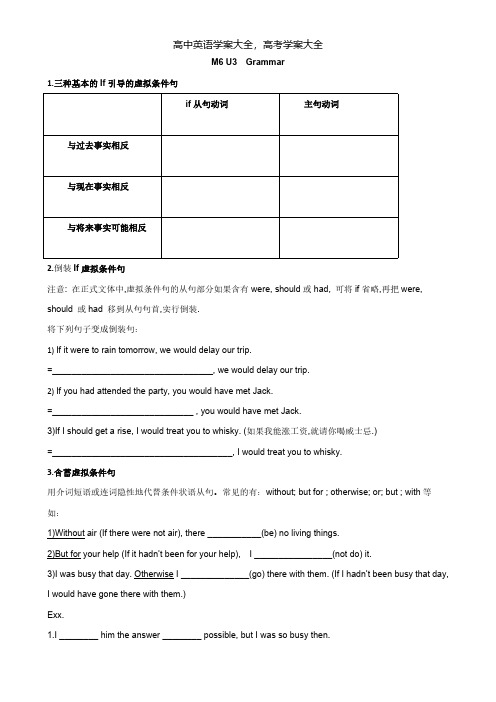
M6 U3 Grammar1.三种基本的If引导的虚拟条件句if从句动词主句动词与过去事实相反与现在事实相反与将来事实可能相反2.倒装If虚拟条件句注意: 在正式文体中,虚拟条件句的从句部分如果含有were, should或had, 可将if省略,再把were, should 或had 移到从句句首,实行倒装.将下列句子变成倒装句:1) If it were to rain tomorrow, we would delay our trip.=_________________________________, we would delay our trip.2) If you had attended the party, you would have met Jack.=_____________________________ , you would have met Jack.3)If I should get a rise, I would treat you to whisky. (如果我能涨工资,就请你喝威士忌.)=_____________________________________, I would treat you to whisky.3.含蓄虚拟条件句用介词短语或连词隐性地代替条件状语从句。
常见的有:without; but for ; otherwise; or; but ; with等如:1)Without air (If there were not air), there ___________(be) no living things.2)But for your help (If it hadn’t been for your help), I ________________(not do) it.3)I was busy that day. Otherwise I ______________(go) there with them. (If I hadn’t been busy that day,I would have gone there with them.)Exx.1.I ________ him the answer ________ possible, but I was so busy then.A. could tell; if it had beenB. must have told; were itC. should have told; had it beenD. should have told; should it be2.But for their common efforts, they ______ achieved so much in their research..A. could haveB. will not haveC. could not haveD. have not3. ______ your advice, I would never have got the job.A. But forB. As forC. Apart fromD. Except for4.He must have missed the train, or he ______ here then.A. should beB. would beC. would have beenD. had to be5. Without electronic computers, much of today’s advanced technology ______ achieved.A. must have beenB. could have beenC. should haveD. would not have been6. I was in a hurry that day. Otherwise I ______ to talk to you.A. had stoppedB. would have stoppedC. stoppedD. had to stop4.混合虚拟条件句很多情况下,从句和主句并不与同一时间的事实相反.例如:1)If you had followed my advice, your English would be much better.从句与__________事实相反,主句与_________事实相反2)If he weren’t a kind-hearted man, he wouldn’t have helped such a man as you that day.从句与__________事实相反,主句与_________事实相反3)If it hadn’t been for you, I would have to make another trip there tomorrow.从句与__________事实相反,主句与_________事实相反Exx.1.Had Paul received six more votes in the last election, he ______ our chairman now.A. must have beenB. would have beenC. wereD. would be2. If you _____ that late movie last night, you wouldn’t be sleepy.A. haven’t watchedB. didn’t watchC. hadn’t watchedD. wouldn’t have watched3. Had you listened to the doctor, you _____ all right now.A. areB. wereC. would beD. would have been5.综合练习1. If you had followed my advice, you ________(be) able to finish the work now.2. If I ______ (be) you, I __________________(go) to her birthday party last night.3. If you _________ (work) hard now, you ___________ (have) a bright future later on.4. _____ it rain tomorrow, we would have to put off the visit to the Bridge.A. WereB. ShouldC. WouldD. Will5. _____ I known he needed money so badly, I might have managed to help him.A. UnlessB. WhenC. IfD. Had6. _____ I be free tomorrow, I could go with you.A. CouldB. ShouldC. MightD. Must7.___________, all the students would hear.A. If the teacher had spoken louderB. If the teacher will speak louderC. Had the teacher spoken louderD. If the teacher spoke louder8. If the professor ______ the experiment on time, he ____very happy.A.finished, would be , B. finished, be C. will finish , will be D. finish , would be9. You didn't let me drive. If we _____ in turn, you _____ so tired.A. drove; didn't getB. drove; wouldn't getC. had driven; wouldn't have gotD. were driving; wouldn't get10.What should we do if it _______tomorrow?A. should snowB. were snowC. snowD. will snow11. If it ________ tomorrow, we would have to put off the visit to the Bridge. Which one is wrong? A. were to rain B. should rain C. would rain D. Rained12.. He must have had an accident, or he____________ here then.A. would have beenB. had beenC. should have beenD. could be13.We didn't know his telephone number, otherwise we _________ him.A. would have telephonedB. must have telephonedC. would telephoneD. had telephoned14. Without electricity human life ________ quite different today.A. isB. will beC. would have beenD. would be15. He hesitated for a moment before kicking the ball, otherwise he ________ a goal.A. had scoredB. scoredC. would scoreD. would have scored。
江苏省泗洪中学高考英语一轮复习 Unit3 Back to the p
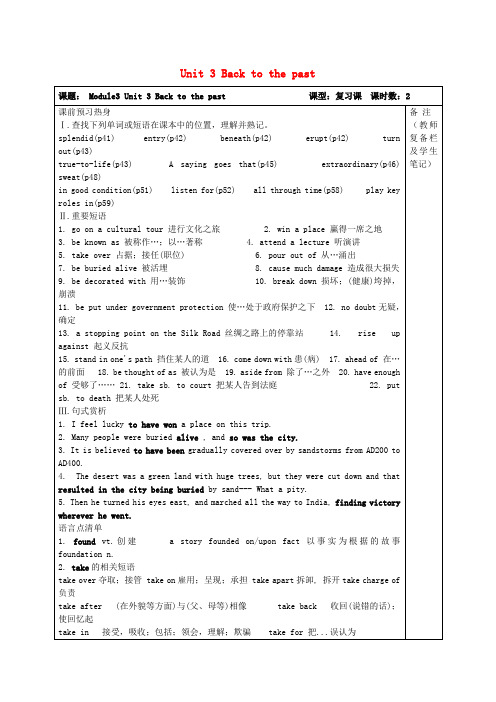
6.true-to-life逼真的 real-life实在的 life-sizeadj.(艺术作品)与真人/实物一样大的
know-how诀窍,专门知识air-to-air 空对空 air-to-ground 空对地 back-to-back 背靠背
It never rains but it pours.不雨则已, 一雨倾盆;祸不单行。pour down倾泻
pour in/into(使)川流不息地涌入pour out大量涌出, (从壶、罐等)倒出(饮料),倾诉
5.flee(fled fled) fleeingflee for one's life逃命
语言点清单
1.foundvt.创建a story founded on/upon fact 以事实为根据的故事foundation n.
2.take的相关短语
takeover夺取;接管take on雇用;呈现;承担 take apart拆卸, 拆开take charge of负责
take after(在外貌等方面)与(父、母等)相像take back收回(说错的话);使回忆起
Deadly car bombsexplodedin northernSyriabut there has been no immediate responsibility claim for it.
4.pourvt.倒出(液体);倾诉flow, run, stream, pour这些动词均有“流动,涌出”之意
Unit 3 Back to the past
课题: Module3Unit3Back to the past课型:复习课 课时数:2
近年高考英语一轮优练题模块6Unit3Understandingeachother牛津译林版选修6
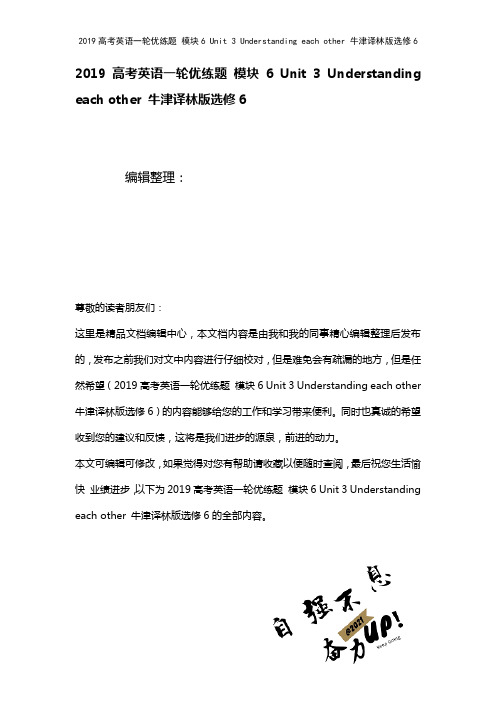
2019高考英语一轮优练题模块6 Unit 3 Understanding each other 牛津译林版选修6编辑整理:尊敬的读者朋友们:这里是精品文档编辑中心,本文档内容是由我和我的同事精心编辑整理后发布的,发布之前我们对文中内容进行仔细校对,但是难免会有疏漏的地方,但是任然希望(2019高考英语一轮优练题模块6 Unit 3 Understanding each other 牛津译林版选修6)的内容能够给您的工作和学习带来便利。
同时也真诚的希望收到您的建议和反馈,这将是我们进步的源泉,前进的动力。
本文可编辑可修改,如果觉得对您有帮助请收藏以便随时查阅,最后祝您生活愉快业绩进步,以下为2019高考英语一轮优练题模块6 Unit 3 Understanding each other 牛津译林版选修6的全部内容。
Unit 3 Understanding each other一、阅读理解。
Dear Parents:I’m delighted that you are considering the British Intern ational School for your children's education. Our school offers first class international education delivered by experienced, highly qualified and professional staff.We aim to provide a high quality British—style education characterized by:The arrangement of the English National Curriculum to meet the needs of international and local students and offering an insight into the local culture。
(新课标)2021高考英语一轮总复习Unit3Understandingeachother教案牛津译林版选修6
Unit 3 Understanding each other对应学生用书p99重点短语,汉译英1.更不用说2.习惯于3.占据(时间或空间)4.毕竟5.赶走6.脱掉7.对……感到熟悉8.寻求9.参加10.做某事有困难11.发出(光/热等) 12.相信13.带某人参观,游览14.控制,支配[答案]1.letalone2.get/beaccustomedto/getusedto3.takeup4.afterall5.drive...away6.takeoff7.befamiliarwith8.huntfor9.takepartin10.havetrouble (in) doingsth.11.giveout12.believein 13.showsb.around 14.havepowerover句型操练·背诵与仿写,1.Manyforeigners havetroublegetting accustomedtoit.(P35,L3940)那些新来的人对这里的气候很难适应。
Thenewcomers .2.Theydislikeitwhen peopledonotlookatthecards,soremembernottojustputtheminyourpocketwithoutlooking.(P43,B)他们很欣赏物理老师总是那么认真地批改作业。
Theyappreciate.3.Whilestayingwith theInuitpeople youwillhavethechance torideonadogsledandtra velinasealskinboat.(P46,L57)仿写在采访期间,你有可能见到那位科学家。
While ,you .4.Thereare manydifferenttribes that belongtotheNativeAmericanIndiangroup.(P47,L4849)仿写任何事都无法阻止中国人民前进。
2019届一轮复习译林版选修6Unit3Understanding each other单元学案设计(21页word解析版)
2019届一轮复习译林版选修6Unit3Understanding each other单元学案设计写作句型锤炼主体段落常用句型锤炼:as引导的定语从句先熟读背诵——精彩句型烂熟于心1.As is known to us/As we all know, knowledge is power.众所周知,知识就是力量。
2. As is always the case with language learning, Mandarin learning also calls for lots of practice.和学习语言一样,学习普通话也需要大量的练习。
(2015·四川卷·满分作文)3.This is such a difficult question as nobody can work out.这是一个那么难的问题,没人能解决。
4.This is the same computer as I bought the other day.这台电脑和我前几天买的那台电脑属于同一款。
(同一类)5.As has been said above, grammar is not a set of dead rules.正如上面所说的,语法不是一套死规则。
6.I've never seen such a talented young man as he is.我从未见过像他这样才华横溢的年轻人。
后临摹仿写——妙语佳句信手拈来1.他们用孩子们能听懂的简单的英语交谈。
They__talked__in__such__simple__English__as__children__could__understand. 2.这个书包和我昨天丢失的(书包)相似。
This__is__the__same__schoolbag__as__I__lost__yesterday.3.我会提供给你一些你可能用得着的东西。
英语牛津译林选修6Unit3同步导学案及答案Reading
二次备课处英语牛津译林版选修6Unit 3同步导学案及答案(Reading)Module 6 Unit 3 Understanding each other 导学案Reading Period 2(语言知识课)Learning aims:1.Help students to understand the passage better2.Learn the usage of the following words and phrases: experience3.Understand some difficult sentences:Learning important points:Make sure students can use those words and phrases correctlyLearning guide:Read , recite and practice自主预习:1Review the new words learnt last class (A级)根据首字母或汉语提示写出单词在句中的适当形式1.He has a_________ a large sum of money after years of hard work.2.In China ,it is a t__________ that the young look after the old in theirfamily.3.The boss was very much pleased by you a________ of the situation.4.The actor tripped over when going to the stage, which put him into ane__________ situation.5.When comparing two different cultures , we should notice both thed___________ and the similarities.6.Before the debate ,the teacher wrote down the t______ of the debate onthe blackboard.7.He is one of those who are not satisfied with the ____________(招待) ofthe conference.8.Over 80% of the students will ___________(参加)in the environmentalcampaign.9.It is said that the poor man’s grandfather was a relative of the___________(王室的) family ,but few believe it.10.Have you ever eaten a(n) _________(火鸡)?11.I always feel nervous when talking in English with __________(本国的)English speakers.12.My grandfather never drinks ________(酒), but he smokes a lot.Try to remember the phrases(B级)2. 写出下列短语的汉语意思,并用这些短语的适当形式补全句子1. even though________2. in celebration of _____________3. in other words _____4. all the time__________________5. get used to_________6. adjust to _________________7. log off___________ 8. after all___________________a. The party was held _______________Father and Mother’s silver wedding.b. As it was very hot , she kept the air-conditioner working_____________.c. ___________ he received little education , he still managed to become the CEO of a large company.d. As a student ,you must _____________studying hard day and night.e. After he entered the dark room , it took a while for his eyes to _________the blacness.f. She had ___________before I told her anything about the meeting.g. There is no need to be mad at Johnny. ___________, he is four years old.h. They asked him to leave; ____________, he was fired.自主预习:Learning some language points.(方法引导:熟读课文并借助字典去查阅相关知识点的用法)(B级)1.experience①做动词意思为___________________②做不可数名词意思为____________________③做可数名词意思为______________________e.g. The child had never _____________ kindness.这孩子从未受过善待。
【教案】高中英语译林版(江苏)大一轮复习选修六Unit 3 Understanding each other
Ⅰ.高考单词→识记·思考·运用1.核心词汇①________n.描述,叙述;账户v.认为;解释,说明②greet v t.和某人打招呼(或问好)→________n.问候;问候语③congratulate v t.向(某人)道贺,祝贺→________n.祝贺,恭喜④________n.冒犯;侮辱→offend v.冒犯;使生气;犯罪⑤adjust v i.&v t.适应,习惯;调整,调节→________n.调整,调节;适应⑥________adj.习惯于;惯常的→accustom v t.使习惯于⑦familiar adj.通晓的;熟悉的→________adj.陌生的,不熟悉的⑧________n.庆典;庆祝活动;庆祝→celebrate v t. &v i.庆祝,庆贺⑨expectation n.期望,盼望→________v t.期待,盼望;预料;猜想⑩________n.勇敢→brave adj.勇敢的⑪________ adj.音乐的n.音乐剧→musician n.音乐家⑫________ adj.神秘的,奇怪的→mystery n.神秘;神秘的事或人答案①account②greeting③congratulation④offence ⑤adjustment⑥accustomed⑦unfamiliar⑧celebration⑨expect ⑩bravery⑪musical⑫mysterious2.常考词汇①gesture n.________ v.________②feast n.________③hug v t.& v i.& n.________④reception n.________⑤emperor n.________⑥religion n.________⑦business card________⑧roast v t.________ adj.________⑨bow n.________⑩arrow n.________答案①手势;姿势;示意动作做手势,用动作示意②盛宴,宴会;节日③拥抱,抱紧④招待会;接待;接受⑤皇帝⑥宗教⑦名片⑧烤;烘焙烤的;焙的⑨弓;蝴蝶结;琴弓⑩箭;箭头标记用所给单词的适当形式填空1.Without your timely help,I wouldn’t ________(finish) it on time. 2.In his youth,however,he never left his hometown,let alone ________ (travel) to another country.3.Last week,he visited Beijing and the Forbidden City where many ________(emperor) once lived.4.They find themselves working to support the lifestyle to which theyhave so quickly become ________ (accustom).5.Food can also have a specific meaning,and play a significant role in a family or culture’s ________(celebration).6.I don’t see how ________ (music) instruments can help improve manners in public.7.Many foreigners have trouble getting ________(accustom) to it. 8.After a good seat height________,you also need to________the seat position before and after.(adjust)9.Contrary to your________,I couldn’t attend your birthday party.I had________to,but I was walking out of my house when an________visitor came,which made me change my initial plan.(expect) 10.Be cautious when you speak in public,because not only what you say might________some people,but the tone and attitude behind your words might cause greater________to all of your relationships,thus resulting in many people thinking your behavior is________.(offend)答案 1.have finished 2.travelled 3.emperors 4.accustomed 5.celebrations 6.musical 7.accustomed8.adjustment;adjust 9.expectations;expected;unexpected10.offend;offence;offensive 【联想·积累】❶“金融”家族①account n.账目;账户②budget n.预算(案)③capital n.资金;资本④cheque n.支票⑤interest n.利息⑥withdraw v t.提取现金❷a-前缀表语形容词荟萃①alike相似的;同样的②ashamed感到羞耻的③asleep睡着的④awake醒着的;清醒的❸-al结尾形容词集合①historical历史的②digital数码的③electrical用电的;与电有关的④physical身体的⑤mental精神的⑥musical音乐的,配乐的❹后缀-ly高频副词集锦①fortunately/luckily幸运地②obviously 显然地③carefully 小心地④successfully 成功地⑤honestly 诚实地⑥slightly 微微地,轻轻地❺-ation结尾高频名词集萃①graduation 毕业;毕业典礼②appreciation 欣赏;感激;感谢③celebration 庆祝;庆典④congratulation 祝贺⑤consideration 考虑⑥conservation 保护;保护区⑦expectation 期望⑧adaptation 适应;改编本开心词场→核心单词串记At the reception,he was accustomed to congratulating others.However,only a minority responded to his greetings.So he ensured to adjust his feelings,which accounted for his expectation. Ⅱ.重点短语→识记·思考·运用1.动词+副词①take ________占据(时间或空间);开始从事;拿起②let ________更不用说③show sb ________带某人参观答案①up②alone③around2.动词+介词①adjust ________适应②do ________没有……也行③belong ________属于④dream ________梦见;梦想答案①to②without③to④of3.be+形容词/副词+介词①be home ________是……的家园②be familiar ________通晓,熟悉答案①to②with4.其他①be supposed ________ do sth 应该做某事②be/get accustomed to ________ sth 习惯做某事③________ all毕竟,终究④congratulate sb ________ sth 祝贺某人某事⑤have trouble ________ sth 做……有困难⑥get ________ trouble陷入困境答案①to②doing③after④on⑤(in) doing⑥into用左栏所给短语的适当形式填空1.Susan is important for me,I can’t imagine what I’d ________her. 2.I know how busy you must be and naturally I won’t want to ________too much of your time.3.I’m so sick today that I can’t walk as far as the kitchen,________ go to the zoo with you.4.I’m sorry.I ________ not ________ this area.Please ask somebody else.5.Don’t be too curious about things you ________ not ________ know. 6.Please don’t hesitate to turn to us for help whenever you ________dealing with the problems.7.A t first I didn’t like English food,but having lived in England for one year,I’ve ________ it.8.Each great man ________his time and can come only at his proper moment.答案 1.do without 2.take up 3.let alone 4.am;familiar with 5.are;supposed to 6.have trouble (in)7.got accustomed to 8.belongs to【联想·积累】❶let短语集合①let...down使……失望;放下②let go 释放;松手③let in 放进来④let off 放(炮、烟火等)⑤let out 泄漏;释放⑥let alone更不用说❷“be +adj.+with”短语荟萃①be satisfied with 对……满意②be busy with 忙于……③be popular with 受……欢迎④be familiar with 对……熟悉⑤be strict with 对……严格❸all短语小结①in all 总共,合计②all in all 总的来说,大体而言③at all 根本;完全④above all 首先,最重要的⑤after all 毕竟Ⅲ.经典句式→识记·思考·运用原句背诵感悟1.In Thailand,people greet each other by putting their hands together and bowing.在泰国,人们双手合十并鞠躬来相互打招呼。
- 1、下载文档前请自行甄别文档内容的完整性,平台不提供额外的编辑、内容补充、找答案等附加服务。
- 2、"仅部分预览"的文档,不可在线预览部分如存在完整性等问题,可反馈申请退款(可完整预览的文档不适用该条件!)。
- 3、如文档侵犯您的权益,请联系客服反馈,我们会尽快为您处理(人工客服工作时间:9:00-18:30)。
江苏省泗洪中学 2016 届高三英语一轮复习体验单
课题: Module 6 Unit 3 2 Understanding each other 课型:复习课 课时数: 备 注 (教师 复备栏 及学生 笔记)
课前预习热身 Ⅰ.查找下列单词或短语在课本中的位置,理解并熟记。 p33 a travel brochure; make a reference book ; a minority culture; greet ;hug; p39 as strong as a horse; as busy as a bee; as pool as a church mouse; as cool as a cucumber; sleep like a log ; p40 expectation; p41 emperor; let alone ;p42 show somebody around; take up; p43 taboo ;religion; gesture; greeting; slight; business card Ⅱ.重要短语 1 cultural differences 文化差异 2 a live hen 一只活的母鸡 3 lay an egg 下蛋 ,产卵 4 first finger 食指(index finger) 5 cause offence 冒犯 6 fond childhood memories 美好的童年回忆 7 gather around 聚集 8 cook something over the fire 在篝火上 煮 9 serve several purposes 起几个作用 10 have power over 控制,支配 11 do without 没有…也行,将就 12 Share something in common 和…有共同 之处 13 set off fireworks 放烟花 14 hunt for food 捕猎食物 15 be carved from 由…雕刻/carve…into…把…雕刻成 16 be home to/be the home of 是…的家园,栖息地 Ⅲ.课文回归---原句翻译 1.____________________________________________________________________________ 许多外国人很难适应这种做法。(get/become/be accustomed to)(P35L39-40) 2.____________________________________________________________________________ _____________________________________________________________________________. 违反禁忌通常会使相关的人及其周围的人感到生气或尬尴。 (concerned adj. 后置定 语)(P43) 3.____________________________________________________________________________ _____________________________________________________________________________. 在泰国和东南亚的其他一些地区, 通常的打招呼方式是双手合十并微微鞠躬。 (press) (P43) 4.___________________________________________________________________________. 他们被称为“平原印第安人” ,因为他们生活在平原上。(as)(P43L50) 语言点清单 1.Thailand 泰国 重要国家、地名归纳:the Middle East 中东,中东地区 Netherlands 荷兰 Arab 阿拉伯 人 Brunei 文莱 Korea 韩国;朝鲜 Ukraine 乌克兰 Libya 利比亚 Iran 伊朗 Iraq 伊拉克 Maldives 马尔代夫 Sierra Leone 塞拉利昂 Syria 叙利亚 2.ensure (doing) sth/that 保证(做)某事,担保,确保 (make sure) Eg. Please ensure that all the lights are switched off. 请务必将所有的灯关掉。 拓展 insure v.为…投保;给…上保险 n. insurance 保险 guarantee n. 保证,担保 ;保修单 under guarantee 在保修期 n. guarantor 担保人,
